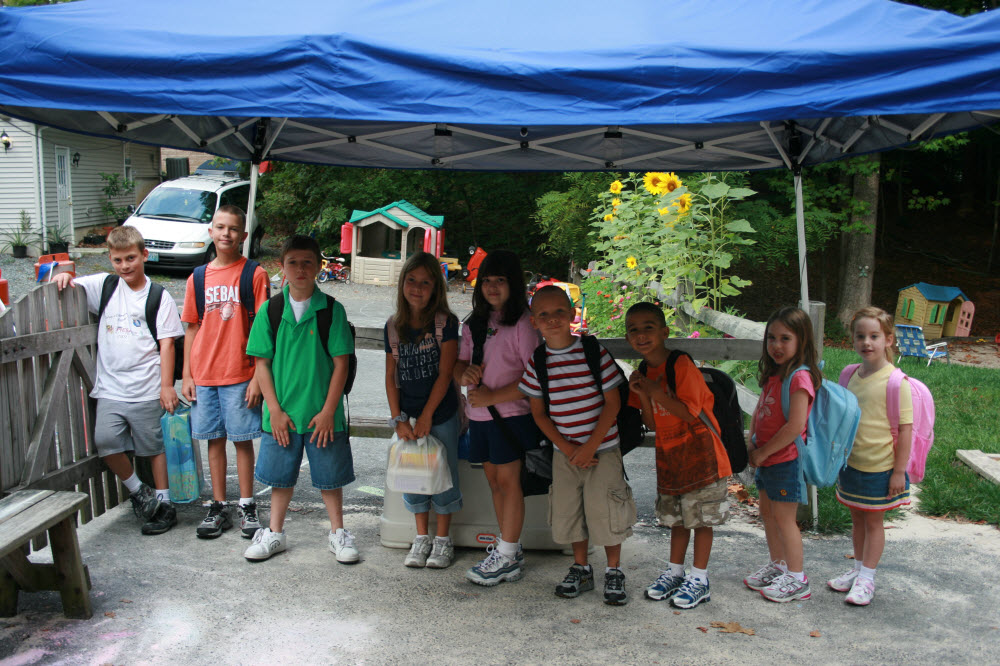Helping Your Child Adjust to Nursery School
The following suggestions may be useful in helping your child adjust to Nursery School.
- Talk to your child about Busy Bee. The school is a special place to be in an environment designed for children and is also a place to make friends, to play and to learn. School is fun, but that does not mean that all the child does is play.
- There are special times to do various activities at school. Help the child to understand that the day is divided into different parts, a time to play and a time to rest, a time to learn and a time to eat, a time to talk and a time to listen, etc.
- A sense or order is important. The children take great pride in “their” school. Each child will be expected to put away what he takes out and help in the general room clean-up.
- Help your child get ready for school by teaching him to use the bathroom by himself. This includes pulling up pants, washing hands, etc. When purchasing play clothes for young children, it is helpful to keep this in mind.
- Help the child to understand that the toys at school belong to the school and not to any one child. They are there for everyone to use and to enjoy. If a child brings in his toys from home, he should be ready to share them.
- Learning how to be a friend is an important part of Nursery School. Respect for others, ourselves and our property is encourage. Good manners make everyone nicer to know.
- Rest is essential. Much of the behavior most bothersome to adults is caused by the child’s not having had adequate rest. An overly-tired child is neither co-operative nor happy. You may find that a child needs more rest than usual while adjusting to school.
- Help the child to understand that school is a three day a week program (if that’s your schedule) and that these are his special days to attend school. Good attendance helps prepare a child for his school years ahead as well as helping him adjust to our program.
- Help your child learn to recognize his name the way it will be printed in school using upper and lower case letters. Example: S c o t t y
When printing names on papers try to always put name in the upper left hand corner of the paper. This helps the child learn to read from left to right. V a n - The teachers are there to help. Any problems may be discussed with the Director. Please do not discuss these problems in the presence of the child. A good time to telephone the Director is in the evening after the child is in bed. For most children, Busy Bee is a child’s first experience with school and we do everything possible to prepare them for the years ahead, and give them a good attitude toward school.

Guides for Parents and Teachers
- Apprehension over the child’s adjustment is sensed by the child. Adults attitude about the Nursery School should be favorable because children sense attitudes and copy them. Have good expectations for the child.
- Initial adjustment is easiest outdoors, but not always convenient or possible. Teachers express warmth and affection according to the child’s mood and needs.
- The teacher shows the child that she is interested in them and respects their personality.
- When a child just sits and looks, they are absorbing the actions within their surroundings. It is not essential that the child participate the first few weeks in all of the activities.

Pointers for Helping Mothers
- Leave the guidance of your own child to the teacher while at school. The child should be free to come to their mother for comfort and affection whenever they wish.
- Do not show disturbance at children’s misdeeds. Keep the situation unemotional and voice low and calm.
- Require children to do necessary things as a matter of course.
- Do not expect children (especially new ones) to be constructive all the time or to enter into all activities.
- There is no objection to good natured noise, but help the children realize that voices must be somewhat softer inside than out.
- Do not feel that you failing in your duty if not formally occupied every moment of your visit. Parents should feel free to observe.
- Cultivate a sense of leisure. A pleasant unhurried atmosphere is more important than any particular achievement.
- Encourage the child to discover sensory delight in his environment since this contributes to his emotional growth.
- Try to have each child help themselves up to their capacity. Work for gradual improvement. Do not insist upon self-help to the point of making it irksome to the child, especially at the end of the day.
- Do not hurry a child who is intent on their job.
- Give sufficient help to make the child satisfied with their accomplishment.
- Encourage the child to finish one task before beginning another.
- Do not hesitate to show sympathy and affection when a child seems to need it.
- It is normal for a child to react emotionally in their own mother’s presence. Treat it as a matter of course. They will gradually adjust to sharing you.
- Please do not discuss your child or any other child in the group with the teacher in his presence.
- Please feel free to discuss any concerns you may have about the school with the teacher after class is dismissed.
- Please feel free to suggest any new art materials, trips, songs, books, etc., that you think will contribute to the enrichment of the program. If you have a particular knowledge, talent, or ability to contribute, please let the teacher know. She will plan with you a time it may be used.
